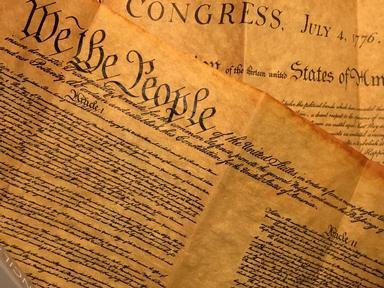Quiz Answer Key and Fun Facts
1. The Eleventh Amendment pertains to state immunity from suit. On the face of the Eleventh Amendment, who is forbidden from suing the state?
2. In Chisolm v. Georgia (1793), which precipitated the adoption of the Eleventh Amendment, the Supreme Court of the United States entered a default judgment against the state of Georgia in a debt action. Why was the case heard in the Supreme Court at all?
3. On the face of the Eleventh Amendment, the jurisdiction of what court is limited?
4. Hans v. Louisiana (1890), as it has been subsequently interpreted by the Supreme Court, changed the way the Court interprets the Eleventh Amendment. Although there are exceptions, who is now generally prohibited from bring suit against the state?
5. Congress can explicitly "abrogate," or limit, the Eleventh Amendment immunity of the state, but only when it passes laws pursuant to its authority under what other Constitutional provision?
6. Because the Eleventh Amendment is part of the Constitution (which is the "highest law of the land") a state may not voluntarily waive its Eleventh Amendment immunity.
7. State sovereign immunity is not necessarily limited to the states themselves. If you sued each of the following for one million dollars, which one would most likely NOT be protected by the Eleventh Amendment?
8. Thanks to a legal "fiction" developed by courts in response to the breadth of the state sovereign immunity doctrine, many suits which might otherwise be barred by the Eleventh Amendment are allowed in federal court. Generally, what feature do these cases share that allows them to avoid the immunity problem?
9. Without an explicit provision of law (state or federal) abrogating or limiting state immunity, can a state ever be a named party in a federal lawsuit?
10. In what year did the Eleventh Amendment officially become part of the Constitution of the United States?
Source: Author
gypsy1326
This quiz was reviewed by FunTrivia editor
gtho4 before going online.
Any errors found in FunTrivia content are routinely corrected through our feedback system.

